2014年秋,人教版九年级英语,unit9 section B 2a
2014_人教新目标_九年级英语_Unit_9_Section_B__2b
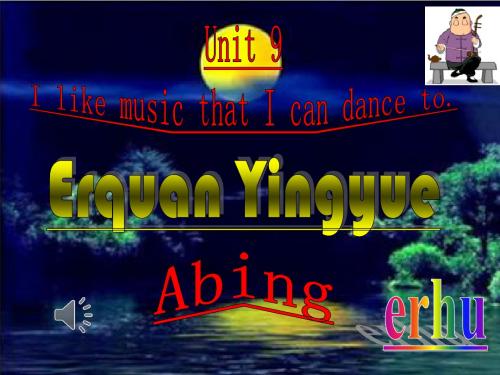
2b Read the passage and answer the questions.
1.Which musician does the passage mainly talk about?
2. What is the name of his most famous piece of music?
定语从句
Sad but Beautiful 凄美
Last night one of my Chinese friends took me to a concert of Chinese folk music. The piece which was played on the erhu especially moved me. The music was strangely beautiful, but under the beauty I sensed a strong sadness and pain. The piece had a simple name, “Erquan Yingyue” (Moon Reflected on Second Spring), but was one of the most moving pieces of music that I’ve ever heard. The erhu sounded like it was crying, and I almost cried along with it as I listened. Later I looked up the history of “Erquan Yingyue”, and I began to understand the sadness in the music.
The music was written by Abing, a folk musician who was born in the city of Wuxi in 1893.His mother died when he was very young. Abing’s father taught him to play many musical instruments, such as the drums, dizi and erhu, and by age 17, Abing was known for his musical ability. However, after his
Unit9SectionB(2a-2e)课件人教版英语九年级全册
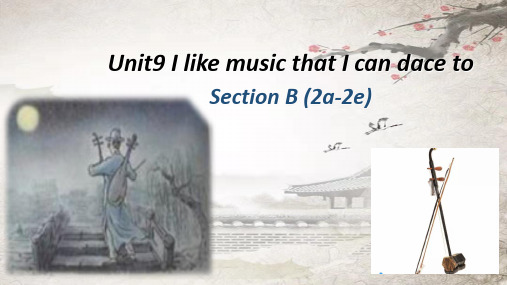
this reason, many people _____ him as the
musician (that/who) has greatly influenced erhu music. So it is really a _p_i_ty__ that not many pieces
Erquan Yingyue
Q3 How doetshethmeoswt fraimteorusfeel about this piece of music ? Cshaindesbeuftolkbmeuasuictiiafnul
He feels ________________.
Fast-reading Find out main ideas
3 I almost__cr_ie_d__a_lo_n_g_w__it_h_ it as I
listened.
跟随...哭
when
Main ideas
Supporting details 可支持的细节
Abing lived a 1.His mother _d_i_e_d_ when he was very young. very hard
a piece of music named
2. It_aw_sa_tsr_o_n_g_s_其a_d中_n_e最_s_令s_a人_n_感d_动p_a_的i_n_.._.feel
ErquanYingyue
o_n_e_o_f_t_h_e_m__o_st_m__o_v_in_g_pieces of music that I’ve ever heard. 作品
人教版英语九年级 Unit 9 Section B (2a-2e) 课件
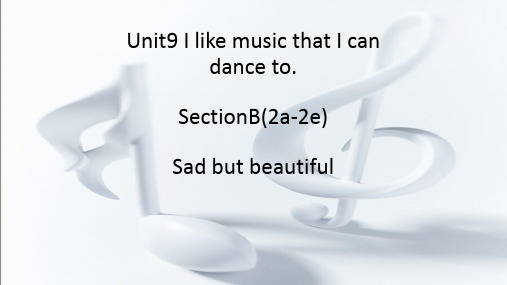
pain wounds sense pity praise
Abing played music (that/who) could touch the hearts of people. When we listen to his music, we can_se_n_s_e_ both the beauty and the sadness in it. It makes us think about the w_o_u_n_ds and_p_a_i_n_(that/who)we have experienced in the past. For this reason, many people _p_ra_i_se_ him as the musician who has greatly influenced erhu music. So it is really a __p_it_y_ that not many pieces of his music were recorded.
beautiful… • I sensed a strong
sadness and pain • It was one of the most
moving pieces of music I’ve ever heard.
• The erhu sounded so sad that I almost cried along with it as I listened.
—— LvJi
Music and life
Music is power.
It gets us through
the dark and pain.
Music and life
Music is peace. It helps us heal(治疗) the wounds.
英语人教版九年级全册Unit 9 Section B (2a-2d)
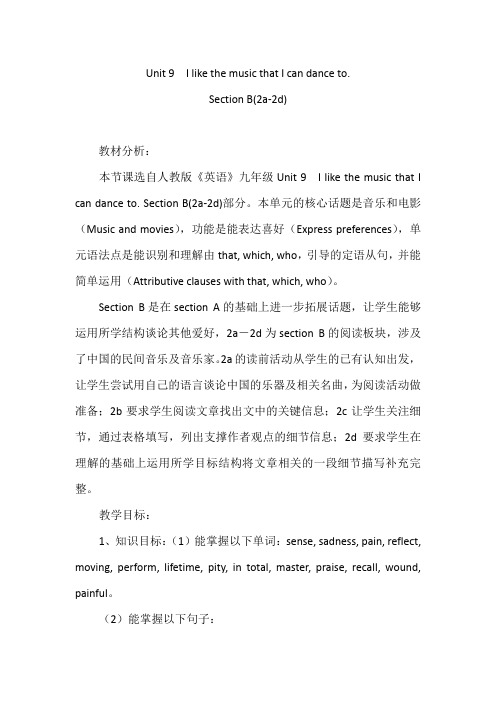
Unit 9I like the music that I can dance to.Section B(2a-2d)教材分析:本节课选自人教版《英语》九年级Unit 9 I like the music that I can dance to. Section B(2a-2d)部分。
本单元的核心话题是音乐和电影(Music and movies),功能是能表达喜好(Express preferences),单元语法点是能识别和理解由that, which, who,引导的定语从句,并能简单运用(Attributive clauses with that, which, who)。
Section B是在section A的基础上进一步拓展话题,让学生能够运用所学结构谈论其他爱好,2a-2d为section B的阅读板块,涉及了中国的民间音乐及音乐家。
2a的读前活动从学生的已有认知出发,让学生尝试用自己的语言谈论中国的乐器及相关名曲,为阅读活动做准备;2b要求学生阅读文章找出文中的关键信息;2c让学生关注细节,通过表格填写,列出支撑作者观点的细节信息;2d要求学生在理解的基础上运用所学目标结构将文章相关的一段细节描写补充完整。
教学目标:1、知识目标:(1)能掌握以下单词:sense, sadness, pain, reflect, moving, perform, lifetime, pity, in total, master, praise, recall, wound, painful。
(2)能掌握以下句子:①..but it was one of the most moving pieces of music that I’ve ever heard.②He performed in this way for many years.③It is a pity that only six pieces of music in total were recorded for the future world to hear, but his popularity continues to this day.④It’s sad beauty not only paints a picture of Abin g’s own life but also makes people recall their deepest wounds from their own sad or painful experiences.2、能力目标:①运用that/which/who引导的定语从句来谈论个人爱好;②培养学生的阅读理解能力和分析归纳能力。
人教版英语九年级上册 Unit 9 Section B (2a-2e)

Unit 9 I like music that I can dance to.
Section B (2a-2e)
Learning Goals
➢ Key words & phrases: sense, sadness, pain, reflect, moving, perform, lifetime, pity, look up, perform, lifetime, pity, total, in total, master, praise, recall, wound, painful.
Background Information
阿炳( 1893—1950)原名华彦钧,我国知名民间艺人,《二泉映 月》便是其最具代表性的作品。34至35岁时他双目相继失明,因此 也有“瞎子阿炳”之称。因生活所迫,阿炳流浪街头,靠卖艺为生。 1950年夏, 中央音乐学院杨荫浏、曹安和教授专程前往无锡为阿炳 演奏录音,此时阿炳已完全荒弃音乐达三年之久,经过三天的练习, 分两次录音,共留下《二泉映月》、 《听松》、《寒春风曲》三首二胡作品 和《大浪淘沙》、《龙船》、《昭君出塞》 三首琵琶作品。同年阿炳便悄然离世。
Chinese bamboo flute: Purple Bamboo Melody(紫竹调)
erhu: Erquan Yingyue(二泉映月);
Horse Racing(赛马)
suona: Bainiao Chaofeng
(百鸟朝凤);
Quanjiafu
(全家福)
Look at the title of the passage and the following picture and predict the answers to the questions.
人教版九年级英语Unit-9-Section-B-(2a-2e)PPT课件

dongbula
Stings (弹拨乐器)
.
5
gu
bianzhong
.
yunluo
Percussion (打击乐器)
6
erhu
Strings (拉弦乐器)
.
horse head string instrument
7
2a
How many Chinese musical instruments do you know about? Do you know any famous pieces of music that are played on
Unit 9 I like music that I can
dance to.
Section B (2a-2e)
.
1
Learning Targets
Ø Key words & phrases:
sense, sadness, pain, reflect, perform, pity, total, master, praise, wound, painful, get married, in this way, by the end of, in total, not only…but also…
1
of music named
strangely
Erquan Yingyue.
beautiful…
2
Abing lived a very _____ life.
Abing’s musical
3
skills made him very
______.
.
13
Paragraph 1: 指导
读本段文章可知:作者听到二泉映月时被
人教版九年级上册英语授课课件 Unit 9 Section B (2a-2e)

课文呈现
2b. Readthepassageandanswerthequestions. 1.Whichmusiciandoesthepassagemainlytalkabout? 2.WhatisthenAambienogf.hismostfamouspieceofmusic?
3.Howdoesthewriterfeelaboutthispieceofmusic? ① ErquanYingyue.
nsedastrongsadness
music named andpain.
Erquan Yingyue.
Hismotherdiedwhenhewasveryyoun g. Andafterhisfatherdied,
2 Abing lived hislifegrewworse. a very Hedevelopedaseriousillnessandbec
课文呈现
2e. StudentAisaforeignvisitorwhoisinterestedinAbingandhismusic.
StudentBisaChinesestudentwhoknowsaboutAbing.
Байду номын сангаас
Usetheinformationinthepassagetomakeaconversation.
very______
__.
课文呈现
2d. Circlethatorwhoandfillintheblankswiththewordsinthebox. Abingplayedmusic (that/who) couldtouchtheheartsofpeople.
Whenwelistentohismusic, wecan_______boththebeautyandtsheensasdenessinit. Itmakesusthinkaboutthe_______and__p_a__in___ (thawt/owuhnod)s wehaveexperiencedinthepast. Forthisreason, manypeople________himasthemusicianwhohasgreatlyinfluence prdaeisrheumusic. Soitisreallya____p_i_ty__thatnotmanypiecesofhismusicwererecorde d.
2014年秋新目标英语九年级课件:Unit 9 I like music that I can dance to Section B(2a—2e)
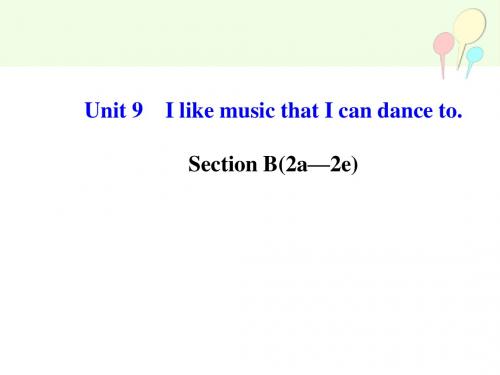
*Have you found the lost dog? 你找到那只丢失的狗了吗? *I found out the phone number by looking it up. 通过查找, 我查到了那个电话号码。
【妙辨异同】
look up/look for/find/find out的用法辨析 查阅, 指在词典等资料中查找, 代词作宾语
to understand the sadness in the music. 后来我查阅了《二泉映 月》的历史, 才开始理解了音乐中的悲伤。
*My little dog is lost. All of my friends are helping me to look
for it. 我的小狗丢了。我所有的朋友都在帮我找它。
__________________ __________________ __________________ →__________ (n. )悲伤; 悲痛 →__________ (adj. )动人的; 令人感动的
12. pain(v. )
答案: 7. 表扬 12. painful
→__________ (adj. )令人痛苦的; 令人疼痛的
__________________
__________________ __________________
6. pity(n. )
答案: 1. sense 6. 遗憾 2. pain
__________________
3. reflect 4. perform 5. 一生
7. praise(v. ) 8. recall(v. ) 9. wound(n. ) 10. sad(adj. ) 11. move(v. )
人教版英语9年级全册Unit9_SectionB(2a-Self_Check)教案

3a-3b部分是写作训练版块。
3a是一个写作前的思考准备,呈现了与音乐或电影相关的问题,要求学生填写信息,整理写作要点。
3b布置写作任务并且提供了相关的短语和表达,以便学生完成写作任务。
【通过本单元的学习学生需掌握哪些综合技能】
T:Now let’s enjoy a video to learn more about Chinese musical instruments.
1.通过free talk的形式复习表达喜好的句型。
2.通过图片展示乐器类型导入本课话题,吸引学生的注意力。
3. “听歌识曲”激发学生的学习兴趣,调动学生的学习热情。
3.培养学生的阅读能力和归纳能力。
4.复习that/who/which引导的定语从句的用法.
5.学会用that/who/which引导的定语从句描述自己的喜好,并能发表简单的评论。
6.学会应用本单元的知识谈论自己的喜好、感受和原因,并能在喜好上给别人提出建议。
7.会用本单元的常见句型结构写出相应的短文,提高学生的写作能力。
T:Do you know any Chinese musical instruments?
2.Show students some pictures of Chinese musical instruments and ask students to tell the names.
Brass & woodwind:dizi, xiao, suona, cucurbit flute
Then check the answers.
4.Get students find out the Attributive clauses in the passage and try to understand.
2014 九年级英语 unit 9 Section B 2
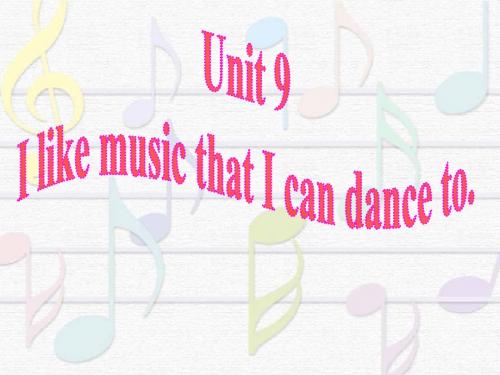
4. My father prefers quiet beaches. My father prefers beaches ____ ___ quiet _____. that are 5. I talked to the man. The man is our teacher. The man who ___ _ _____ __ I talked to is our teacher.
2. Fill in the blanks with who, that or which. More than one answers may be possible.
A: Hi, Cindy! Would you like to see Sky High in 2050 this weekend? B: Hmm…no, I don’t think movies that/which _________ try to describe the future are very interesting. Could we see City Danger instead? A: You mean, the new police story _________ that/which was filmed in five countries? B: Yes, that’s the one. The actor ________ plays who the hero used to be a schoolteacher! A: OK, sure. It sounds like something _________ that/which we both will enjoy!
2c
Paragraph
Main idea
人教英语九年级全一册Unit9Section B 2a—2e-课件
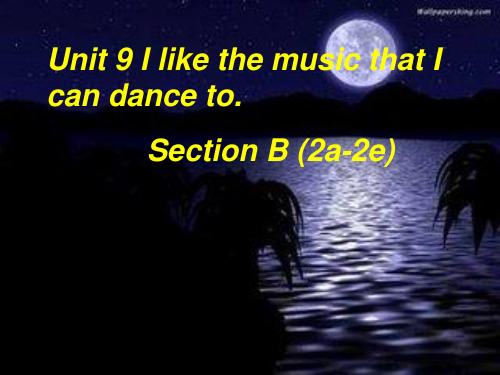
Paragraph 2: hard/difficult 1.died 2.poor, illness, blind 3.homeless 4.make money
Paragraph 3: popular
1.play over 600 pieces, write 2.play and praise
2. What is the name of his most famous piece of music?
While-reading
Look through and find the key words of each paragraph
Paragraph 1: moved/moving Paragraph 2: hard/difficult Paragraph 3: popular
2) Try to guess the meaning praise of these words in the box.
Abing played music (that/who) could touch the hearts of people. When we listen to his music, we can _s_e_n_se__ both the beauty and the sadness in it. It makes us think about the _p_a_i_n_ and _w_o_u_n__d_s(that/who) we have experienced in the past. For this reason, many people p_r_a_i_s_e him as the musician (that/who) has greatly influenced erhu music. So it is really a _p__it_y__ that not many pieces of his music were recorded.
人教英语九年级全一册Unit9Section B 2a—2e(共19张)-课件
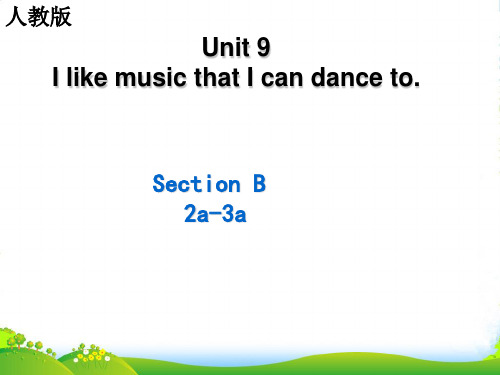
Unit 9 I like music that I can dance to.
Section B 2a-3a
Play a guessing game piano
smooth music
rock music drum
guitar
country music
ErHu
classical music
成读 的书
两,
件要
事么
。旅
。行
,
身
体
和
灵
魂
总
要
我们,还在路上……
S1
S2
S3
Eg: favorite kind My favorite kind of music is rock music ,just like I Believe. I like
it,because this kind of music has great lyrics that can encourage
life
experience of his life
①he had no home
②lived on the street and played music to make money
③make a living by performing on the street.
While-reading
Read paragraph3 and fill in the form.
want
to do anything. (F)
4.Erquan Yingyue was one of the most moving music that I’ve ever heard. (T)
While-reading
- 1、下载文档前请自行甄别文档内容的完整性,平台不提供额外的编辑、内容补充、找答案等附加服务。
- 2、"仅部分预览"的文档,不可在线预览部分如存在完整性等问题,可反馈申请退款(可完整预览的文档不适用该条件!)。
- 3、如文档侵犯您的权益,请联系客服反馈,我们会尽快为您处理(人工客服工作时间:9:00-18:30)。
Abing’s amazing musical skills made him very popular during his lifetime. By the end of his life, he could play over 600 pieces of music, many of those were written by Abing himself. It is a pity that only six pieces of music in total weld to hear, but his popularity continues to this day. Today, Abing’s Erquan Yingyue is a piece which all the great erhu masters play and praise. It has become one of China’s national treasures. Its sad beauty not only paints a picture of Abing’s own life but also makes people recall their deepest wounds from their own sad or painful experiences.
Sad but Beautiful
Last night one of my Chinese friends took me to a concert of Chinese folk music. The piece which was played on the erhu especially moved me. The music was strangely beautiful, but under the beauty I sensed a strong sadness and pain. The piece had a simple name, Erquan Yingyue (Moon Reflected on Second Spring), but it was one of the most moving pieces of music that I’ve ever heard. The erhu sounded so sad that I almost cried along with it as I listened. Later I looked up the history of Erquan Yingyue, and I began to understand the sadness in the music.
The music was written by Abing, a folk musician who was born in the city of Wuxi in 1893. His mother died when he was very young. Abing’s father taught him to play many musical instruments, such as the drums, dizi and erhu, and by age 17, Abing was known for his musical ability. However, after his father died, Abing’s life grew worse. He was very poor. Not only that he developed a serious illness and became blind. For several years, he had no home. He lived on the streets and played music to make money. Even after Abing got married and had a home again, he continued to sing and play on the streets. He performed in this way for many years.
